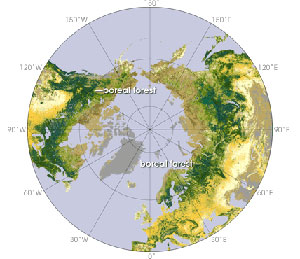Ontario to preserve area of forest the size of Uganda
Ontario to preserve area of forest the size of Uganda
Jeremy Hance, mongabay.com
July 31, 2008
|
|
The government of Ontario has announced it will preserve 56 million acres of boreal forest from all types of development. The reasons for such a large conservation plan are numerous: preservation of the forest will benefit the world as a massive carbon storehouse; the area is a major source of freshwater; and home to over 200 species, many of which are threatened, such as polar bears, wolverines, and caribou. The area will be open to eco-tourism, but will be closed to mining, logging, and gas exploration.
The 56 million acres, or 222,000 square kilometers, is equal to the entirety of the U.S.’s roadless areas. However, while roadless areas in the U.S. cover 2 percent of the nation’s total land mass, the amount designated under protection in Ontario is a staggering 43 percent of the province’s total land mass. It is equal to the size of the U.S. state of Minnesota, or the country of Uganda, if you prefer.
 The boreal forests (also called taiga) encircle the Arctic, occupying the northern expanses of Asia, Europe, and North America. In this map, the boreal forests are dark green areas, tundra and barren land are tan, while crops and grasslands are yellow. In total, the boreal forest covers 16.6 million square kilometers (6.41 million square miles.) (Map by Robert Simmon, based on data provided by BU Land Cover and Land Cover Dynamics.) |
Although details of the plan have not been fully revealed, the government states that it will uphold the rights of 36 indigenous tribes who occupy various traditional territories in the land. The tribes make-up almost the entirety of the 24,000 people inhabiting the area.
Scientists estimate the entire boreal forest—stretching across Canada, Northern Europe, and Russia—is the world’s largest carbon sinkhole, storing 186 billion tons of carbon. Premier of Ontario, Dalton McGinty, noted that the area preserved would store 12.5 million tons by itself.
In a press conference making the announcement, McGinty stated that the preserve is currently “unspoiled and undisturbed, and if there’s one thing we know for sure, it’s not going to stay that way forever unless we do something.”
Canada is facing increased pressure for mining, logging, and gas exploitation, due to rising demand from developing nations, while demand has not slowed in the developed world. “We need to plan for that development,” McGuinty said. “We will only get one chance to get this right.”